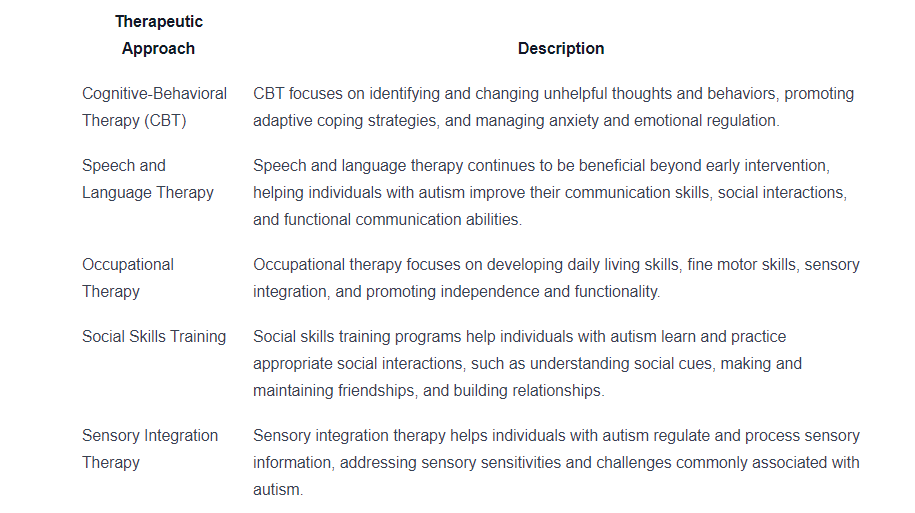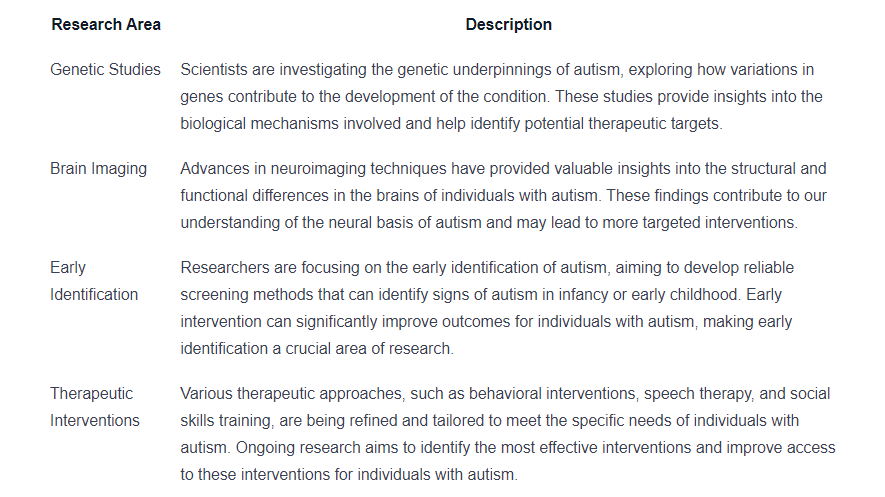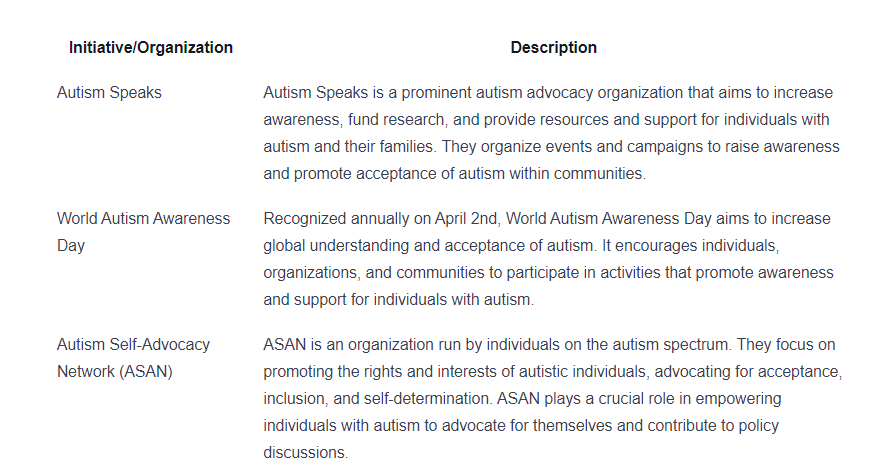Is Autism Natural
<https://www.ncbi.nlm.nih.gov/pmc/articles/PMC10185896/>

Understanding Autism
Autism is a complex neurodevelopmental disorder that affects individuals in various ways. To gain a better understanding of autism, it is essential to explore its overview and common characteristics.
Overview of Autism
Autism, also known as Autism Spectrum Disorder (ASD), is a lifelong condition that affects how individuals perceive and interact with the world around them. It is characterized by difficulties in social communication and interaction, as well as restricted and repetitive patterns of behavior, interests, or activities.
According to the latest statistical data, approximately 1 in 54 children in the United States is diagnosed with autism. It is important to note that autism is not limited to any specific race, ethnicity, or socioeconomic background.
Common Characteristics of Autism
Autism presents a wide range of characteristics that can vary from person to person. These characteristics may manifest differently and to varying degrees in each individual. Some of the common characteristics associated with autism include:
- Challenges in social communication: Individuals with autism may experience difficulties with verbal and nonverbal communication. They may have trouble understanding and using gestures, facial expressions, and body language. Some individuals may have limited speech or may not speak at all.
- Repetitive behaviors and interests: People with autism often engage in repetitive behaviors, such as hand-flapping, rocking, or repeating certain phrases or movements. They may also have intense and specific interests in certain topics, objects, or activities.
- Sensory sensitivities: Individuals with autism may be hypersensitive or hyposensitive to sensory stimuli, such as noise, lights, textures, or smells. This can result in sensory overload or seeking sensory stimulation.
- Difficulty with change and transitions: Changes in routines or unexpected events can be challenging for individuals with autism. They may prefer predictability and sameness in their environment and may struggle with adapting to new situations.
Understanding these common characteristics of autism can provide insights into the experiences and challenges faced by individuals on the autism spectrum. It is important to approach autism with empathy, acceptance, and support to create a more inclusive and understanding society.
The Natural Aspect of Autism
When exploring autism, it is important to understand the natural factors that contribute to its development. Autism is believed to have a combination of genetic and environmental influences, which play a significant role in shaping the condition.
Genetic Factors
Genetic factors are considered to be a major contributor to the development of autism. Research has shown that there is a strong genetic component to autism, with certain genes being associated with an increased risk of developing the condition.
Studies have identified several genes that are potentially linked to autism. However, it's important to note that there isn't a single gene responsible for autism. Rather, there are multiple genes involved, each contributing to a person's susceptibility to the condition.
The heritability of autism, which refers to the proportion of the risk attributed to genetic factors, has been estimated to be around 80%. This indicates that genetic factors play a significant role in the natural predisposition to autism.
Environmental Influences
While genetics play a crucial role in autism, environmental factors also contribute to its development. Environmental influences can include prenatal and perinatal factors, as well as early childhood experiences.
Prenatal factors that have been implicated in autism include maternal infections during pregnancy, exposure to certain medications, and complications during birth. Additionally, exposure to environmental toxins, such as air pollution and certain chemicals, has also been studied in relation to autism risk.
It is important to note that environmental influences alone are not sufficient to cause autism. Rather, they interact with genetic factors to increase the likelihood of developing the condition.
Understanding the natural aspects of autism, including the genetic and environmental factors, is crucial in gaining insights into its origins. By recognizing the multifaceted nature of autism's development, researchers and clinicians can work towards a better understanding of the condition and develop effective interventions and support strategies.
Controversies Surrounding Autism
Autism has been a subject of various controversies throughout history, with ongoing debates surrounding its nature and origins. Understanding the historical perspectives and current debates can provide insight into the complex nature of autism.
Historical Perspectives
Historically, different theories and beliefs have shaped the understanding of autism. In the early 20th century, autism was viewed as a result of poor parenting or inadequate emotional bonds between parents and children. This perspective, known as the "refrigerator mother" theory, has long been discredited due to its lack of scientific evidence.
Over time, advancements in research and understanding have led to a more nuanced understanding of autism. The recognition of autism as a neurodevelopmental disorder and the identification of genetic factors have played a significant role in shaping the current understanding of autism.
Current Debates
Contemporary debates surrounding autism continue to generate discussion and inquiry. One area of debate is the role of vaccines in autism. Despite extensive scientific evidence showing no link between vaccines and autism, some individuals and groups continue to promote this controversial idea. It is important to note that the scientific consensus strongly refutes any connection between vaccines and autism.
Another ongoing debate concerns the concept of neurodiversity and the perception of autism as a disability. Proponents of the neurodiversity movement argue that autism is a natural variation of human neurology, rather than a disorder to be cured or fixed. They emphasize the need for acceptance, accommodation, and support for individuals with autism.
On the other hand, there are those who view autism primarily as a medical condition that requires intervention and treatment. They advocate for early diagnosis, therapy, and other interventions aimed at improving the lives of individuals with autism.
These debates highlight the complexity and diversity of perspectives surrounding autism. While scientific research and evidence continue to advance our understanding of autism, it is important to approach discussions on this topic with sensitivity and respect for the diverse experiences and viewpoints within the autism community.
Understanding the historical context and current debates surrounding autism can contribute to a more comprehensive understanding of this complex condition. By fostering open and informed discussions, we can promote greater awareness and support for individuals with autism and their families.
Neurodiversity and Autism
Recognizing the unique characteristics of individuals with autism, the concept of neurodiversity has emerged, emphasizing the celebration and acceptance of differences. This section explores the importance of celebrating differences and embracing neurodiversity within the context of autism.
Celebrating Differences
Autism is a naturally occurring variation in neurodevelopment that results in a range of strengths, challenges, and perspectives. Celebrating the differences associated with autism involves acknowledging and valuing the unique abilities and perspectives of individuals on the autism spectrum. It emphasizes moving away from the notion of autism as a deficit and instead focusing on the strengths and talents that individuals with autism possess.
By celebrating differences, society can foster an inclusive environment that recognizes and appreciates the diverse ways in which individuals with autism experience the world. This approach promotes understanding, acceptance, and respect for individuals on the autism spectrum, encouraging them to embrace their unique qualities and contribute to their communities.
Embracing Neurodiversity
Embracing neurodiversity goes beyond celebrating differences and extends to advocating for the acceptance and inclusion of individuals with autism in all aspects of society. It recognizes that autism is a natural variation of the human experience and challenges the idea that there is a single "normal" or "correct" way of thinking, learning, or perceiving the world.
By embracing neurodiversity, society acknowledges that individuals with autism have valuable perspectives and contributions to offer. It promotes equal opportunities, empowerment, and self-advocacy for individuals on the autism spectrum, ensuring their voices are heard and respected.
Embracing neurodiversity also involves creating supportive environments that accommodate the unique needs of individuals with autism. This can include providing reasonable accommodations in educational settings, workplaces, and public spaces, fostering an inclusive culture that values diversity, and promoting accessible communication and social interaction.
Supporting Individuals with Autism
Understanding and embracing the concept of neurodiversity can pave the way for effective support and intervention for individuals with autism. The next section will explore early intervention and therapeutic approaches that can play a crucial role in supporting individuals on the autism spectrum.
Supporting Individuals with Autism
When it comes to supporting individuals with autism, early intervention and therapeutic approaches play a crucial role in helping them thrive. By providing appropriate support and interventions, individuals with autism can develop important skills and improve their overall quality of life.
Early Intervention
Early intervention refers to the provision of specialized support and services to children with autism at a young age, typically before the age of three. This early support focuses on addressing the unique challenges and needs of individuals with autism to promote their development and learning.
Research has shown that early intervention can have a significant positive impact on the outcomes for children with autism. It can help improve communication skills, social interactions, behavior management, and cognitive abilities. Early intervention programs may involve a combination of therapies, such as:
- Applied Behavior Analysis (ABA): ABA is a structured approach that focuses on teaching and reinforcing desired behaviors while reducing challenging behaviors.
- Speech and Language Therapy: This therapy helps individuals with autism improve their communication skills, including speech, language comprehension, and social communication.
- Occupational Therapy: Occupational therapy focuses on developing fine motor skills, sensory integration, and activities of daily living to enhance independence and functionality.
- Social Skills Training: This type of therapy helps individuals with autism learn and practice appropriate social interactions, such as turn-taking, making eye contact, and understanding social cues.
Early intervention programs are tailored to the individual needs of each child with autism, and they often involve a multidisciplinary team of professionals, including psychologists, speech therapists, occupational therapists, and special education teachers.
Therapeutic Approaches
In addition to early intervention, various therapeutic approaches can support individuals with autism throughout their lives. These approaches aim to address specific challenges associated with autism and promote skill development and independence.
Some common therapeutic approaches used in the treatment of autism include:

It's important to note that different therapeutic approaches may work better for some individuals with autism than others. The choice of therapy should be based on an individual's specific needs, strengths, and goals.
By providing early intervention and utilizing appropriate therapeutic approaches, individuals with autism can receive the support they need to reach their full potential and lead fulfilling lives. It's crucial to recognize that each person with autism is unique and may require a personalized approach to support their individual strengths and challenges.
Future Perspectives on Autism
As our understanding of autism continues to evolve, ongoing research and advocacy efforts hold promise for the future. In this section, we will explore the exciting advances in autism research and the growing advocacy and awareness efforts surrounding this condition.
Research Advances
Researchers are dedicated to unraveling the complexities of autism, seeking to improve diagnosis, treatment, and support for individuals on the autism spectrum. Here are some key areas of research that are shaping our understanding of autism:

Advocacy and Awareness Efforts
Advocacy and awareness efforts play a vital role in promoting acceptance, understanding, and support for individuals with autism. Here are some key initiatives and organizations driving advocacy and awareness efforts:

Through ongoing research and advocacy efforts, the future for individuals with autism holds promise. As we continue to expand our knowledge of autism and work towards a more inclusive society, it is essential to support research endeavors, promote awareness, and advocate for the rights and well-being of individuals on the autism spectrum.
Sources
https://www.abtaba.com/blog/is-autism-natural
https://pubmed.ncbi.nlm.nih.gov/21311979/
https://www.ncbi.nlm.nih.gov/pmc/articles/PMC10185896/
Similar articles
We’re here to help you

Our team is here to assist you in this process. Contact us for any assistance.
it’s easy to apply
We Accept Most Insurances
Our in-network insurance partnerships make ABA therapy more accessible to families throughout our service areas.







Our Insurance Process
We'll request your insurance details to help us verify your plan's coverage for ABA therapy. Once we've received this information, we'll walk you through your benefits, including copayments, deductibles and out-of-pocket maximums, so you know what to expect in advance.
Our team will then handle the preauthorization and all the necessary paperwork.
.svg)





















.jpeg)


































.jpeg)




.jpeg)







.jpeg)











.jpeg)
















